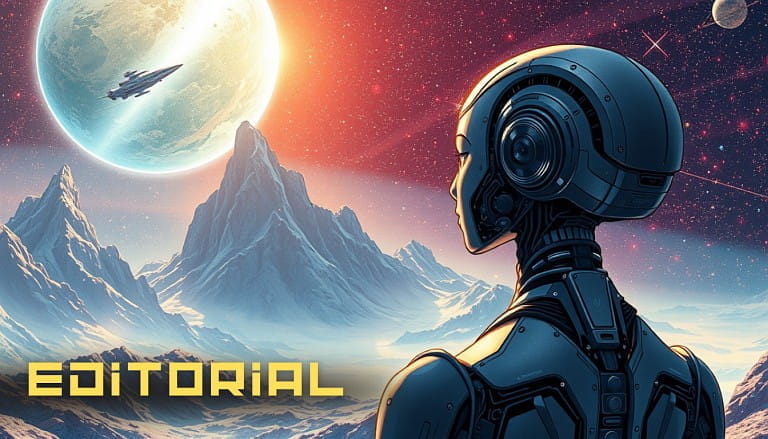Editorial
লেখক: Kalpabiswa
শিল্পী: Team Kalpabiswa
The Autumn Festival, Durga Puja, marks the arrival of Goddess Durga from her heavenly abode to Earth, and the whole world is ready for one of the most culturally significant events, Durga Puja, here in Bengal, India. It is not just about religious or spiritual attainment but a potpourri of cultures involving music, dance, painting, and literature. Pujabarshiki, i.e., the Annual Durga Puja edition, has been catering to generations of readers to quench their need for reading fiction and non-fiction across various genres.
Ujjwal Ghosh paints a strikingly attractive cover picture with an aura of mysticism around it. Kalpabiswa Magazine has been devoted to bringing out the best in the area of science fiction, fantasy, and horror since its conception ten years back, in 2015. Kalpabiswa has witnessed steady growth among Bengali readers, and over the last two years, readership of the English section has been booming; we hope it will continue to thrive with your support. In this edition, we are featuring an intriguing interview regarding the growth and trends of science fiction in India with one of the leading voices in Indian science fiction, Dr. Sami Ahmad Khan, an award-winning author, academician, and much more. We are delighted to include the first Bengali translation of his critically acclaimed English story “15004” by one of our talented editors, Rakesh Kumar Das, known for previously translating George Orwell’s Nineteen Eighty-Four in Bengali. The non-fiction further includes an analytical article by Soubarna Das, where he explores the technicalities related to story generation by artificial intelligence. It will be a treat for the tech-savvy nerds, a common trope among our readers across the Milky Way. The veteran academician, Prodosh Bhattacharya, explores how Hemendra Kumar Roy’s Bengali speculative fiction subverts one British work and creatively reworks another. Ritojit Dasgupta objectively writes about ChatGPT’s dependency on large datasets that might infringe copyright acts. This article provides insight into the current state of affairs!
Let us dive into the fictional arena. Sourav Datta’s science fiction novella “10 GOT 10” takes readers on a mind-boggling journey through a dystopian world dominated by programs. Next, we have Sukanya Datta’s compelling science fiction fantasy, “Level Killing Fields,” dealing with a modern-day tale about the female agents of death, known in India as Vishkanyas, with a definitive twist. In “ProtoTyke,” Olivia Loccisano weaves a nuanced story of psychological exploration about a software engineer who is uniquely battling a heinous social crime. Abanti Pal makes a mark with “And so, I brought her dandelions,” where an individual wakes up in a dream experiment to realise something extraordinary yet simple in its own way. Buma Banerjee Das’s “The Empathy Room” serves as an alarming account of suppressing empathy in a dystopian world. Dystopia is one of the most popular subgenres in science fiction. The subgenre has experienced sturdy growth, starting with We, Nineteen Eighty-Four, and Fahrenheit 451 in the West, as well as Escape, The Wall, and Leila in India. Thus, we have another tale set in a dystopian world; Krishanu Banerjee’s “The Silent Accord” imagines a world where silence is the most expensive delicacy. Debraj Moulick narrates a story of one Japanese scientist against the backdrop of the Second World War in “Madam Madex.” Finally, George Dimitriu juxtaposes multiple realities in an experimental tale about the Nazi army loaded with avant-garde tech; remember the name: “Sensory Crack.”
Kalpabiswa is grateful for the whole-hearted cooperation and contribution of the Editorial Team: Supriyo Das, Dip Ghosh, Santu Bag, Goutam Mandal, Pramit Nandi, Rakesh Das and Debraj Moulick. One Love for the amazing group of warriors.
All in all, the English Section of Kalpabiswa, the Autumn Festive edition, packs an interesting cocktail of investigative articles dealing with AI storytelling, legal implications of ChatGPT, subversions of English tales in Bengali stories, and a thought-provoking interview about the trends in India, as well as global science fiction. The fictions include dystopian tales, cyberpunk, alternate histories, science fiction fantasies, science fiction horror, and socio-psychological horror, among others. Grab your tablet, phone, laptop and PC I am hopeful that this issue will be a unique experience. The Bengali Section: it’s a tour de force.
This is your moment to dive into the amazing world of science fiction, fantasy, and horror in both Bangla and English. I hope that the bilingual nature of this 2025 Durga Puja edition will impress you as a reader.
Happy Reading
Thanking you,
Editorial Team
Kalpabiswa


